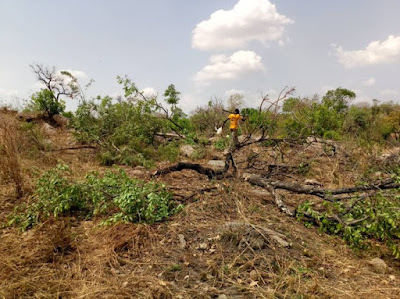BY SAMUEL NABWIISO
Development partners are urging
Uganda to come up with a comprehensive integrated forests resources management
approach and access to clean energy targeting refugees and the hosting
districts across the country.
The partner's from the Food and
Agriculture Organization of the United Nations (FAO) and the World Bank notes
that due to the influx of refugees in Uganda from her Neighboring Countries
such as South Sudan Democratic Republic of Congo, Rwanda and Burundi into
Uganda is fueling the depletion of Country's natural resources such as forests
especially in the refugees hosting districts particularly in West Nile, western
and south western parts of the country.
 |
| some of the Forest that have been cut down due to the influx of Refugees in some parts of the settlement areas |
Speaking during the Launch of two
reports that were conducted to assess the natural Resources degradation in
refugees impacted areas in Northern Uganda and the assessment report on
forests resources Degradation and interventions Options in Refugees, Hosting
areas of Western and Southwestern Uganda, the FAO Country Representative
in Uganda' Antonio Querido,noted that Uganda is losing forests cover at a
higher rates especially in the refugees hosting region's thus the need to act
so that the depleted natural resources are restored.
"Planning and achieving
sustainable forest's and land management in the refugees hosting areas is
crucial to avoid the detrimental environmental Impacts that may occurs due to
the biodiversity destruction “He said during the launch of the reports at the
protea Hotel in Kampala Recently.
According to Querido, government
should implement interventions such as A- forestation, Reforestation and
also establish markets oriented multipurpose wood lots that can support sustainable
supply's of wood fuel, timbers, building materials and other non wood forest's
products.
"As development partners we
hope that if such interventions are well implemented by the various Government agencies
it can mitigates the detrimental environmental Impacts such as soil erosion,
out Blake of diseases, floods that may occurs due the depletion of the
biodiversity in the refugees hosting districts and communities across Uganda
“He added.
 |
| The FAO Country Representative in Uganda Antonio Querido speaking during the Launch of the Reports |
The coverage of the Study, the study
was carried out in Western and south Western Uganda alongside Northern Uganda
targeting West Nile sub region in Western Uganda, the study was carried out in
six settlement areas, namely Kyaka11 in Kyegegwa District, Kyangwali in Kikube
District,Rwamwanja in Kamwenge district,alongside other settlements such as
Kiryandongo in Kiryandongo district and lastly the Oruchinga settlement in
Isingiro District.
From the study it was found that
majority of the refugees in the various settlements were depending on biomasses
as the primary sources of energy and this has fuelled the highest rate of
forest cover and other related biodiversity depletion in the refugees hosting
districts and communities in the surveyed areas.
In the study for instance in
Kyangwali settlement 75.5,% of the refugees were depending on fire wood while
in Kyaka11 settlement charcoal was the major source of energy, and even where
the charcoal has been adopted as the major sources of energy, refugees were
using traditional Charcoal stove's that are not energy efficient which ends up
exposing them to diseases related to the inhalation of smokes.
In the report, the various
Governments agencies such as the ministry of Energy, Environment and the office
of the Prime Minister were cautioned to promote the usage of improved charcoal
stove's especially among the refugees and the hosting communities this can help
them to optimize the usage of biomass fuel effectively.
"There's a desire to optimize
fuel consumption through the usage of more efficient and modern cooking stoves
available on the market.inspite of this several households and refugees are not
migrating to improved one's because of the poor flow of information related to
the availability of the modern Energy , efficient cooking stoves on the market
“Reads part of the Report.
Key findings in the study on the
Biodiversity destruction in the refugees settlements and the hosting communities,
in the Report, it’s reportedly that in South and South Western Uganda Refugees
settlement areas, the study indicates that between 2001 and 2018 total tree
covers losses in Kyaka11 and Kyangwali settlements were near 10% as high in
both the 5 kilometers and 15 kilometers away buffer zones from the refugees
settlement boundaries.
In Kiryandongo settlement areas the
areas according to the study recorded a 73% nature forests cover losses between
2001 and 2018 due to the arrival of refugees in the settlement arae.
The magnitude of Refugees in Uganda,
according to the information available from the office of the Prime Minister,
currently Uganda is hosting about 1.3 million refugees most of them are living
in Northern Uganda; Western parts of the Country, such population have exerted
pressure on the country’s natural resources.
In the report it's revealed that the
total wood demands for cooking in the Northern Refugees settlement camps stood
at 345,000 metric tons per year in the 14 Refugees settlement camps Inthe District’s
of Arua ,Yumbe,Moyo, Adjuman and Lamwo and in the south and Western Uganda
Refugees settlement camps the demands for wood fuel is at 475,000 metric tons
of wood fuel.
Commenting on the report, the World
Bank country manager in Uganda.TonyThompson challenged the Government of Uganda
to implement programs that can address the issues highlighted in the report,
urging that this will help Uganda to over comes Environmental related catastrophist
such as Climate change, Land degradation's.
This
Work is of strategic importance to both the government of Uganda and the
development partners especially the World Bank strategic goals. we urges the
government of Uganda to include issues related to Refugees in natural resources
management in the upcoming National Development plan phase111 Which the
government is developing this will play big roles towards the protection of the
country’s natural resources in the refugees hosting districts and communities
“He said
No comments:
Post a Comment